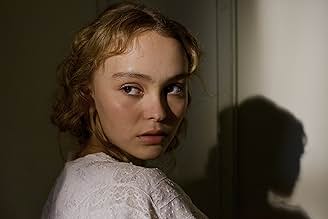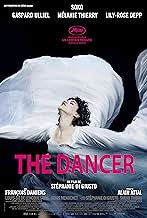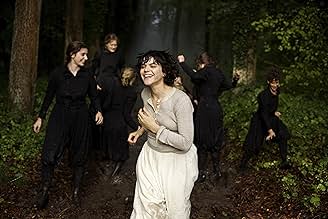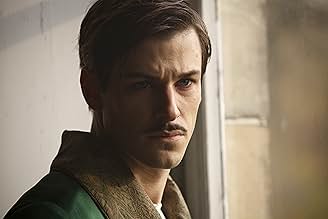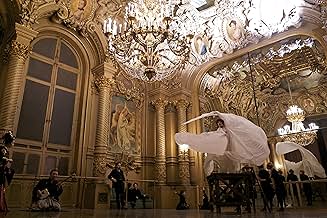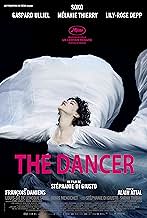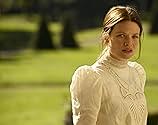VALUTAZIONE IMDb
6,5/10
2899
LA TUA VALUTAZIONE
Loïe Fuller è stata una star delle Folies Bergères e ha ispirato sia Toulouse-Lautrec che i fratelli Lumière. La storia del film ruota attorno alla sua complicata relazione con la sua protet... Leggi tuttoLoïe Fuller è stata una star delle Folies Bergères e ha ispirato sia Toulouse-Lautrec che i fratelli Lumière. La storia del film ruota attorno alla sua complicata relazione con la sua protetta e rivale, Isadora Duncan.Loïe Fuller è stata una star delle Folies Bergères e ha ispirato sia Toulouse-Lautrec che i fratelli Lumière. La storia del film ruota attorno alla sua complicata relazione con la sua protetta e rivale, Isadora Duncan.
- Regia
- Sceneggiatura
- Star
- Premi
- 1 vittoria e 16 candidature totali
William Houston
- Rud
- (as Will Houston)
Matilda Kime
- L'assistante de Louis
- (as Mathilda Kime)
Recensioni in evidenza
I've seen her in 'Augustine' and was very impressed, I tried to find her other films and they are nowhere...
But this was very very nice, Despite that I watched it with ill-timed subs that were I think three to four scenes behind - I had to endure most of it, wishing I oh so new French but I don't.. it definitely sounds lovely though.. lol
But in the end, I did see some people dislike, I don't know why, I did see some critics give it rotten fruits , you say tomatoe I say tomato, whatever, they claimed the writing took liberties with facts... And another wanted to see so much more, I'm like lady , do you want to chip in the funds it takes to see way way more in a film?
I mean was it not one of the most beautiful things to see? scene after succeeding scene, we are rapt with surge of euphoria at how beautiful everything is, it was very cool, and if it did not do justice to the dancer protagonist here on earth, I'm sure if she is not here, she is somewhere else, surely saying, 'dang, that was a fine fine piece of beautiful film making!'
But this was very very nice, Despite that I watched it with ill-timed subs that were I think three to four scenes behind - I had to endure most of it, wishing I oh so new French but I don't.. it definitely sounds lovely though.. lol
But in the end, I did see some people dislike, I don't know why, I did see some critics give it rotten fruits , you say tomatoe I say tomato, whatever, they claimed the writing took liberties with facts... And another wanted to see so much more, I'm like lady , do you want to chip in the funds it takes to see way way more in a film?
I mean was it not one of the most beautiful things to see? scene after succeeding scene, we are rapt with surge of euphoria at how beautiful everything is, it was very cool, and if it did not do justice to the dancer protagonist here on earth, I'm sure if she is not here, she is somewhere else, surely saying, 'dang, that was a fine fine piece of beautiful film making!'
Historians have a way of sterilising cinema. So many words are wasted on whether a film is accurate instead of understanding and enjoying film as an artform. The Dancer (2016) is a bio-pic based on the life of Loíe Fuller who pioneered a hybrid dance performance that integrated visual spectacle and physical movement. Historians can fuss over facts, but others will enjoy what is an aesthetically intense story of creative innovation in late 19th Century Paris.
The story opens with Loíe (Soko) raised by her drunken father on a farm in America. A keen reader with a vivid imagination, she dreams of a career as an actress. After her father dies, she uses money stolen from a would-be seducer to cross the Atlantic in search of fame. She stumbles upon a Parisian theatre looking for a performer to fill the stage during interval. As a talented artist with an eye for design, she conceives of a dance act that disguises her modest dancing talent and creates a dramatic serpentine performance using a costume of batons and swirling bedsheets. Her act is immediately popular. Although physically arduous, the performance evolves to using silk, coloured lights, and dramatic music, and suddenly Loíe is the toast of Paris. When the talented teenage dancer Isadora Duncan (Lilly_Rose Depp) joins the troupe, the stress of dancing on Loíe's body, her penchant to overspend, and her emerging sexual ambivalence, all begin to take their toll.
This is a luscious film to watch. Its rich colour palette, top-shelf production values and unconventional characterisations create the dramatic energy which drives the narrative. Undoubtedly, it is Soko's physicality and her acting style that makes this film work. She has an almost androgynous beauty that the camera exploits; in some scenes she appears dashingly handsome, in others, sublimely feminine. With an emotive range that switches effortlessly from ingénue to sophisticate, she transfixes with her gender-free expressiveness, even under the on- screen competitive pressure of the beautiful young Isadora. The serpentine dance performances are mesmerising. They hang in a space somewhere between classical ballet, modern jazz, and a gyrating living sculpture draped in wings of silk accompanied by Vivaldi under spotlights. It's easy to understand their immense popularity as a dramatic innovation in stage performance. Above all else, The Dancer captures this spirit of excitement.
Reading this film as history gets in the way of enjoying it as visual spectacle and engaging narrative. Loíe Fuller was praised by luminaries of her time, such as Yeats, Toulouse-Lautrec, and Rodin, but largely forgotten in her native country. The Dancer is a tribute to an avant-garde artiste whose legacy lives on in theatrical dance effects that have become an artform in their own right.
The story opens with Loíe (Soko) raised by her drunken father on a farm in America. A keen reader with a vivid imagination, she dreams of a career as an actress. After her father dies, she uses money stolen from a would-be seducer to cross the Atlantic in search of fame. She stumbles upon a Parisian theatre looking for a performer to fill the stage during interval. As a talented artist with an eye for design, she conceives of a dance act that disguises her modest dancing talent and creates a dramatic serpentine performance using a costume of batons and swirling bedsheets. Her act is immediately popular. Although physically arduous, the performance evolves to using silk, coloured lights, and dramatic music, and suddenly Loíe is the toast of Paris. When the talented teenage dancer Isadora Duncan (Lilly_Rose Depp) joins the troupe, the stress of dancing on Loíe's body, her penchant to overspend, and her emerging sexual ambivalence, all begin to take their toll.
This is a luscious film to watch. Its rich colour palette, top-shelf production values and unconventional characterisations create the dramatic energy which drives the narrative. Undoubtedly, it is Soko's physicality and her acting style that makes this film work. She has an almost androgynous beauty that the camera exploits; in some scenes she appears dashingly handsome, in others, sublimely feminine. With an emotive range that switches effortlessly from ingénue to sophisticate, she transfixes with her gender-free expressiveness, even under the on- screen competitive pressure of the beautiful young Isadora. The serpentine dance performances are mesmerising. They hang in a space somewhere between classical ballet, modern jazz, and a gyrating living sculpture draped in wings of silk accompanied by Vivaldi under spotlights. It's easy to understand their immense popularity as a dramatic innovation in stage performance. Above all else, The Dancer captures this spirit of excitement.
Reading this film as history gets in the way of enjoying it as visual spectacle and engaging narrative. Loíe Fuller was praised by luminaries of her time, such as Yeats, Toulouse-Lautrec, and Rodin, but largely forgotten in her native country. The Dancer is a tribute to an avant-garde artiste whose legacy lives on in theatrical dance effects that have become an artform in their own right.
A very beautiful film directed with vigor and taste. To classify this film as biopic does not do justice to it and it is even misleading. I read so many ill directed criticism on what is and what is not historically accurate in the movie. Who cares? Who would criticize the Greek poet Kavafy for misrepresenting historical figures in his poems? For me 'The Dancer' is a poetic film on beauty and the passion for creativity and it was a pleasure to watch. For two hours I was immersed in the film's world, relishing every bit of it; the elliptical decor, the unreal almost lighting, the spectacular dance, the energy. Indeed what I liked most was the fact that the film did not make an effort to faithfully reconstruct an era, but rather create its own unique universe combining various elements in a coherent whole. Let alone the amazing amount of work that went into it, the production design, the choreography, the music. The audacious directorial approach is justified by the result. Soko's choice to play Loie Fuller was excellent as she brought into the part her own fierce determination to develop in the show and music business matched with confident and truthful acting. The film is an amazing feat anyway, but even more so as a debut feature.
The body as art is not hinted, it's the piece. This indulgence in the sensual somehow does not invite perversion. The effect is it's wholly performance authorial, a complete integration of performer and role, which happens just once in a blue moon. She almost dies each time, like a birth effect, same time it brings a cinema of transcendence. And maybe the french would roll their eyes and say, can't believe he fell for our tricks. That she's bringing the effect of the bad girl. But it sees no difference between her, her dance, the cinema. The film could be science fiction, like she is some techno-bird, cranking the levers, the lights, the darkness she emerges under spotlight, her dance like a ritual for the space gods; it's all very steampunk, but where here the era of industrialism begins for great mechanizations to streamline and integrate, so too would be art by the same process, to the same ends but in the way of the ecstatic truth. I'm envious because who ever gets so actualized? You have talents and presences and great ones but rare to actualize within a piece, to see one so wholly expressed where it feels like some endpoint. I sense Soko inspires that like some cinema muse. It's hard to talk about it rationally, same as dance.
The Good: the wonderful costumes, the stunning dance routines, and the performance of Soki in the lead role. Purely as a spectacle, there's plenty to enjoy.
The Bad: the storyline was completely disjointed. Certain scenes and interactions made no sense, suddenly following on from one another in a jarring way. There seemed to be gaps (scenes edited out for length?). It was hard to tell how much time was supposed to have elapsed. The way Soki meets Gabrielle in a car park, and then next scene she's suddenly got some huge show happening: it was bewildering.
Let's not even get started on the confusing relationships. I'm not sure what I was supposed to be watching there, or who was already supposed to have slept with whom.
Ultimately this would have been a better film if they had cut down on the endless scenes of Soki's pain and exercise and bleeding eyes and ice baths, and added a bit more storytelling. Much of the US/ New York stuff could have been cut/tightened (particularly since it wasn't biographically accurate, and served minimal apparent purpose. Save for Ulliel, the NY cast didn't reappear once we moved to Paris).
The Bad: the storyline was completely disjointed. Certain scenes and interactions made no sense, suddenly following on from one another in a jarring way. There seemed to be gaps (scenes edited out for length?). It was hard to tell how much time was supposed to have elapsed. The way Soki meets Gabrielle in a car park, and then next scene she's suddenly got some huge show happening: it was bewildering.
Let's not even get started on the confusing relationships. I'm not sure what I was supposed to be watching there, or who was already supposed to have slept with whom.
Ultimately this would have been a better film if they had cut down on the endless scenes of Soki's pain and exercise and bleeding eyes and ice baths, and added a bit more storytelling. Much of the US/ New York stuff could have been cut/tightened (particularly since it wasn't biographically accurate, and served minimal apparent purpose. Save for Ulliel, the NY cast didn't reappear once we moved to Paris).
Lo sapevi?
- QuizElle Fanning was first attached to play Isadora Duncan, but was later replaced by Lily-Rose Depp.
- BlooperLoie first performed at the Follies Bergere in the early 1890s, but the director of the Follies Bergere is driving an "olde tymey" car from perhaps 2 decades later when Loie ambushes him in his carpark in order to present an impromptu audition.
- Colonne sonoreDestined For Great Things
Composed by Nick Cave and Warren Ellis
Performed by Nick Cave and Warren Ellis
I più visti
Accedi per valutare e creare un elenco di titoli salvati per ottenere consigli personalizzati
- How long is The Dancer?Powered by Alexa
Dettagli
- Data di uscita
- Paesi di origine
- Siti ufficiali
- Lingue
- Celebre anche come
- The Dancer
- Luoghi delle riprese
- Opéra de Vichy, 1 rue du Casino, Vichy, Allier, Francia(scenes in the American theatre)
- Aziende produttrici
- Vedi altri crediti dell’azienda su IMDbPro
Botteghino
- Lordo in tutto il mondo
- 1.960.510 USD
- Tempo di esecuzione
- 1h 48min(108 min)
- Colore
- Mix di suoni
- Proporzioni
- 2.39 : 1
Contribuisci a questa pagina
Suggerisci una modifica o aggiungi i contenuti mancanti

